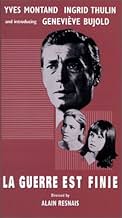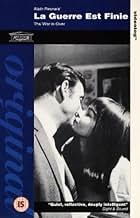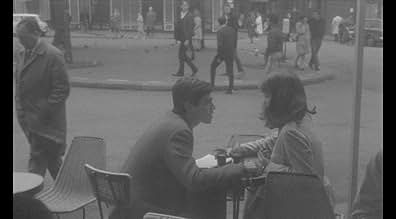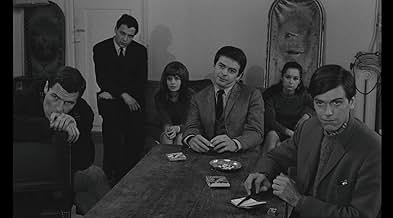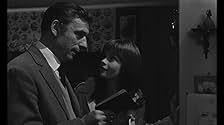AVALIAÇÃO DA IMDb
7,2/10
2,6 mil
SUA AVALIAÇÃO
Adicionar um enredo no seu idiomaA veteran Republican fighter's ardent dedication to overthrow of Franco's regime is challenged. He realizes that the center of political struggle has shifted away from him, and is forced to ... Ler tudoA veteran Republican fighter's ardent dedication to overthrow of Franco's regime is challenged. He realizes that the center of political struggle has shifted away from him, and is forced to make choices about his life and political ideals.A veteran Republican fighter's ardent dedication to overthrow of Franco's regime is challenged. He realizes that the center of political struggle has shifted away from him, and is forced to make choices about his life and political ideals.
- Indicado a 1 Oscar
- 4 vitórias e 4 indicações no total
Avaliações em destaque
Alain Resnais was almost a god of cinema in the 60's. That people actually discussed the meaning of Last Year at Marienbad at parties seems unbelievable today (yet check the posts for Mulholland Drive), but it was a cultural object just as real as a Picasso painting. If I say that La Guerre est finie has aged badly, that's not to say that it didn't hold the attention of liberals 40 years ago.
The politics of the main (male) characters are fossilized. The old Bolshevik ideals have become more and more detached from reality. Diego knows that there will be no general strike in Spain on May 1st, no matter how hard they will it to happen. Pamphlets smuggled by car into the country in false compartments are not being translated into actions. Diego's lack of authenticity is his real problem: he's spent most of his life in France, speaks better French than Spanish, and is watching people 20 years younger than himself taking more radical steps to end Franco's rule.
Marianne has a greater grasp of reality than her lover. After nine years with Diego, she just wants to settle down and have kids, and put an end to the endless coded conversations with her friends (who are ignorant of Diego's revolutionary activities). She watches as Diego gets sloppy--driving with lights out while there's a suitcase full of plastic explosives in the car, as a cop stops them for questioning.
Semprun's script makes Montand into a sexual magnet; has any 20-year-old girl taken off her clothes faster for a tired 45-year-old man? The star system dictates that the male lead be a stud, but there are limits.
The politics of the main (male) characters are fossilized. The old Bolshevik ideals have become more and more detached from reality. Diego knows that there will be no general strike in Spain on May 1st, no matter how hard they will it to happen. Pamphlets smuggled by car into the country in false compartments are not being translated into actions. Diego's lack of authenticity is his real problem: he's spent most of his life in France, speaks better French than Spanish, and is watching people 20 years younger than himself taking more radical steps to end Franco's rule.
Marianne has a greater grasp of reality than her lover. After nine years with Diego, she just wants to settle down and have kids, and put an end to the endless coded conversations with her friends (who are ignorant of Diego's revolutionary activities). She watches as Diego gets sloppy--driving with lights out while there's a suitcase full of plastic explosives in the car, as a cop stops them for questioning.
Semprun's script makes Montand into a sexual magnet; has any 20-year-old girl taken off her clothes faster for a tired 45-year-old man? The star system dictates that the male lead be a stud, but there are limits.
10hhs-3
CAUTION: NOTES ON PLOT INCLUDED
Well, if you think this movie is about hot sex and Franco, then you could stick to Hemingway. A stunning psychodrama about a man who has seen his life burned out after decades of fighting a "good" but hopeless war, recognizes the futility, and sees another generation committing itself to figurative and literal suicide. Does he stop them? Join them? Can he have any effect at all? Does he try? See the movie. If you're into political drama a la Frankenheimer, Zinnemann, or Costa Gavras, this one is a "ten."
But you're right about Genevieve Bujold. Are you ever 8-)
Well, if you think this movie is about hot sex and Franco, then you could stick to Hemingway. A stunning psychodrama about a man who has seen his life burned out after decades of fighting a "good" but hopeless war, recognizes the futility, and sees another generation committing itself to figurative and literal suicide. Does he stop them? Join them? Can he have any effect at all? Does he try? See the movie. If you're into political drama a la Frankenheimer, Zinnemann, or Costa Gavras, this one is a "ten."
But you're right about Genevieve Bujold. Are you ever 8-)
Alain Resnais was part of the so-called Left Bank of the French New Wave, alongside with Varda, Marker and Demy, who were politically much more aware compared to the film fanatics of Cahiers du Cinema (Rohmer, Truffaut, Rivette, Godard, Chabrol). Alain Resnais has always been interested in past but here he focuses on its impact with regards to the future. The War Is Over was his fourth feature, following Hiroshima mon amour, Last Year in Marienbad and Muriel, and still remains as one of the finest films of political cinema. The film builds around the theme of how to come to terms with one's past in order to live in peace with the present. No other place -- maybe Germany or Poland -- offers such a great setting for this but Spain because the shadows of the Civil War are so present. It is a milieu that has become the symbol of the war, so to speak.
Diego Mora (Yves Montad) is an old man who spent his youth as a revolutionary in the Spanish Civil War. Now, thirty years later, he's part of a group that wants to redeem the dreams of the revolution in Paris. All the members of the group are living in the past, and so is Diego. But soon he has a moment of realization and breaks himself away from the chains of illusion and decides to make a change. Thus, The War Is Over is really a story about a man who is living a lie. It tells, rather bleakly in a melancholy tone, about old communists who can't let go off the past.
The War Is Over might just be Resnais' most satisfying work when it comes to somewhat coherent viewing experience. It's his first film with a clear storyline which is relatively easy to follow even if the editing was deliberately (but not self-deliberate!) ambiguous and confusing. Resnais has succeeded perfectly to relay the flow of time. Moreover, through the character played by Yves Montand the viewer can understand the director's thoughts and emotions, no matter how shattered, because he holds the pieces together. It is he through whom the viewer constructs the big picture.
In The War Is Over memories are created for the future. Alain Resnais doesn't try to build the horrors of the past by newsreel footage. He relays the tragedy of the conditions by showing how people are still living in the past, how they are left with unredeemed dreams in their hands. The dream has died in Spain. Of course, Spain is still there but merely as a concrete place full of tourists. People don't understand each other. There is a major breakdown in the communication between the old and the new left. Both are dreaming of a revolution but in their own ways. The legacy of the past torments the protagonist. However, he is not only forced to recall the past endlessly but also to be unable to understand the present reality.
Diego Mora (Yves Montad) is an old man who spent his youth as a revolutionary in the Spanish Civil War. Now, thirty years later, he's part of a group that wants to redeem the dreams of the revolution in Paris. All the members of the group are living in the past, and so is Diego. But soon he has a moment of realization and breaks himself away from the chains of illusion and decides to make a change. Thus, The War Is Over is really a story about a man who is living a lie. It tells, rather bleakly in a melancholy tone, about old communists who can't let go off the past.
The War Is Over might just be Resnais' most satisfying work when it comes to somewhat coherent viewing experience. It's his first film with a clear storyline which is relatively easy to follow even if the editing was deliberately (but not self-deliberate!) ambiguous and confusing. Resnais has succeeded perfectly to relay the flow of time. Moreover, through the character played by Yves Montand the viewer can understand the director's thoughts and emotions, no matter how shattered, because he holds the pieces together. It is he through whom the viewer constructs the big picture.
In The War Is Over memories are created for the future. Alain Resnais doesn't try to build the horrors of the past by newsreel footage. He relays the tragedy of the conditions by showing how people are still living in the past, how they are left with unredeemed dreams in their hands. The dream has died in Spain. Of course, Spain is still there but merely as a concrete place full of tourists. People don't understand each other. There is a major breakdown in the communication between the old and the new left. Both are dreaming of a revolution but in their own ways. The legacy of the past torments the protagonist. However, he is not only forced to recall the past endlessly but also to be unable to understand the present reality.
Yves Montand is a Spaniard in exile in Paris, a Communist working for the central committee in exile in Paris, trying to jump-start the Revolution. He's very professional about what he does. But the Spanish government has arrested agents and he realizes he's grown tired of the never-ending struggle, the insistence of the committee in Paris that their view from a distance gives them better insight than the people who are stationed in Spain. His lover, Ingrid Thulin wants his child, and he indulges in.a tired rant in front of her friends./coworkers tat everything moves and nothing changes.
Montand gives a fine performance as a man growing tired of the always hopeful attitude of the revolutionaries, their insistance on working out the details of life, anxious to snatch small bits of autonomy wherever he can He has grown tired of being a good soldier who sees no end to the war. Will he remain a good soldier? Can he? And what if he cannot?
Alain Resnais movie is far more straightforward than his other works, although he does make liberal use of flashbacks and interpolative stills. With Geneviève Bujold, Jean Dasté, and Michel Piccoli.
Montand gives a fine performance as a man growing tired of the always hopeful attitude of the revolutionaries, their insistance on working out the details of life, anxious to snatch small bits of autonomy wherever he can He has grown tired of being a good soldier who sees no end to the war. Will he remain a good soldier? Can he? And what if he cannot?
Alain Resnais movie is far more straightforward than his other works, although he does make liberal use of flashbacks and interpolative stills. With Geneviève Bujold, Jean Dasté, and Michel Piccoli.
Resnais really impressed me with this film. He uses real locations and finds subtle atmospheric things that almost never turn up in movies. One sees the way a shadow of a tree moves gently back and forth on the wall as two people relax in bed, the way a gust of wind briefly animates a woman's hair in a subway tunnel.
The movie successfully combines an account of resistance to Franco's Spain from an ex-patriot living in Paris (played by Montand), and his life outside of politics. We see not only his political views, but also how he feels about love and his own situation. Beautiful, brave and innovative, this movie also has some of the most passionate, yet restrained and overall fascinating love scenes that I have seen since Peter Sellers and Shirley Maclaine in 'Being There.'
The movie successfully combines an account of resistance to Franco's Spain from an ex-patriot living in Paris (played by Montand), and his life outside of politics. We see not only his political views, but also how he feels about love and his own situation. Beautiful, brave and innovative, this movie also has some of the most passionate, yet restrained and overall fascinating love scenes that I have seen since Peter Sellers and Shirley Maclaine in 'Being There.'
Você sabia?
- CuriosidadesScreenwriter Jorge Semprún's life and work as a member of the central committee of the Spanish Communist party from 1954 to 1965 are the basis of the character Diego Mora played by Yves Montand actions and thoughts in 'La Guerre est finie'.
- ConexõesReferenced in What's My Line?: Yves Montand (2) (1967)
Principais escolhas
Faça login para avaliar e ver a lista de recomendações personalizadas
- How long is The War Is Over?Fornecido pela Alexa
Detalhes
- Data de lançamento
- Países de origem
- Idiomas
- Também conhecido como
- The War Is Over
- Locações de filme
- Boulevard Saint-Germain, Paris 6, Paris, França(tailing the young man at Metro Maubert)
- Empresas de produção
- Consulte mais créditos da empresa na IMDbPro
- Tempo de duração2 horas 1 minuto
- Cor
- Mixagem de som
- Proporção
- 1.66 : 1
Contribua para esta página
Sugerir uma alteração ou adicionar conteúdo ausente

Principal brecha
By what name was A Guerra Acabou (1966) officially released in Canada in English?
Responda
